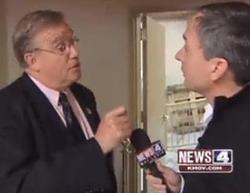Hiding Behind Milk Crates: New Media Strategy
Dick Fleming is President and CEO of the St. Louis Regional Chamber & Growth Association (RCGA), a local Chamber of Commerce.
A local television reporter wanted to know why Mr. Fleming earned $1.8 million in salary and bonuses over a two-year period – despite the fact that job growth in the region has remained flat during his tenure. So the reporter followed Mr. Fleming to a speech at a local hotel and tried to talk to him before and after his talk.
Mr. Fleming tried to avoid the interview with a toxic mix of belligerence, anger, and defensiveness. But it was Fleming’s creative method of dodging a reporter – hiding in a hotel’s back hallway near a stack of milk crates – that will help this story jump the local fire line and turn it into national news. (Video is no longer available.)
By taking extreme measures to avoid the reporter, this “powerful” business leader left viewers with the unmistakable impression of a guilty executive with something to hide. Mr. Fleming failed to remember that in an ambush interview, reporters are looking for good “visuals.” He provided them in spades.
My favorite part of this video is when he tells the reporter he’s not “hiding” in the hotel service hallway, but rather that he’s “waiting for lunch.” I doubt too many viewers will believe that lame excuse, since none of them have likely ever waited for a lunch date in the back hallway of a hotel.
Instead, imagine if Mr. Fleming had warmly greeted the reporter by saying something such as:
“You know, over the past few months, you’ve asked me many questions, including what the Chamber has achieved during my tenure. I want you to know that during my leadership, the Chamber has (list accomplishments). Now, if you’d like to do a more serious interview, you’re going to have to give me more notice. Please contact my office, and we’ll arrange a time to talk.”
If the reporter persisted (and he probably would have), Mr. Fleming could have just repeated that last line (“Again, I’d be happy to speak with you. But I have a full schedule today, and I’m afraid I cannot accommodate your request without notice. Please contact my office and we’ll set up a time. I look forward to speaking with you soon.”)
Then, Mr. Fleming should have arranged a brief phone call with the reporter – even five minutes would have fulfilled his on-camera pledge. Mr. Fleming surely could have prepared thoughtful answers to tough questions in the days between the ambush and the scheduled interview.
Instead, Mr. Fleming reduced his local profile to that of an executive who cowers in back hallways. And that is never an image that plays well with colleagues, partners, or the public.
A big thank you to reader @Lisa_in_Denver for alerting me to this story – and to the Denver Post’s Penny Parker for alerting her to the story! If you see a good story for this blog, please send it to Contact-at-MrMediaTraining.com.
Wait, wait, don’t go! Sign up for our free monthly email packed with tips to make you a better media spokesperson and public speaker. Sign up box is in the upper right of the blog.
Related: March 2011: Five Worst Video Media Disasters
Related: Crisis Communications Lesson: Why I Finally Quit GoDaddy.com




Great piece and great advice. Thanks for the post, and keep up the great work!
Thomas – thank you for the nice words! I’m fortunate to have readers who send me links to these gems – I never would have spotted this one on my own. Thanks for reading, and please don’t be a stranger.
Brad
I’m pretty sure insulting and arguing with a reporter is never a good practice. This is really unbelievable.
What a great example of what NOT to do.
Brad —
Great post and analysis! All I can say about the Fleming interview is that it was the perfect strategy to ensure viewers think you are corrupt and bilking the organization you work for. Truly unbelievable approach to the interview especially since it was something of a gotcha interview.
He could have diffused the situation a long time ago by simply granting the original interview request on his own turf and in a more controlled environment. Instead he gave them great shots of their camera chasing him all over the place … makes for great news TV.
John – Thank you for your nice words (and continued support of this blog)! Good point that he could have diffused this situation a long time ago. The fact that he didn’t makes me (and likely most viewers) believe he had something to hide.